TRIBUTE
Don Mattera’s voice has been stilled, but his powerful words linger on in memory
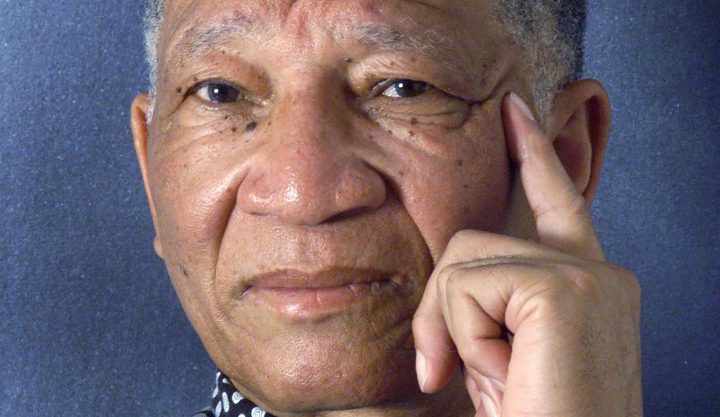
Fiery but sentimental poet activist Don Mattera’s voice is now stilled. We celebrate and remember a friendship.
Back in 1975 when I was a young diplomat assigned to the American Embassy’s public affairs office and library in Johannesburg, it quickly became clear to me our office was both a rest stop and a meeting place for South Africans. Back then, it was very easy for people to enter our premises. There were no security barriers or guards, and because our office was in a downtown building, up just one flight of stairs from busy Commissioner Street, people dropped by all the time.
Many came in to use our library. It was the only one in the city with totally unfettered, open admission, and the seating was fully integrated. People also came by to borrow or return items from our film library. The collection of hundreds of documentaries was extremely popular with schools and community groups all across the country for their classes and other gatherings. (We even shipped our films to destinations across the rest of South Africa.) The library’s resources were highly valued since they were available years before broadcast television and video players came to the country.
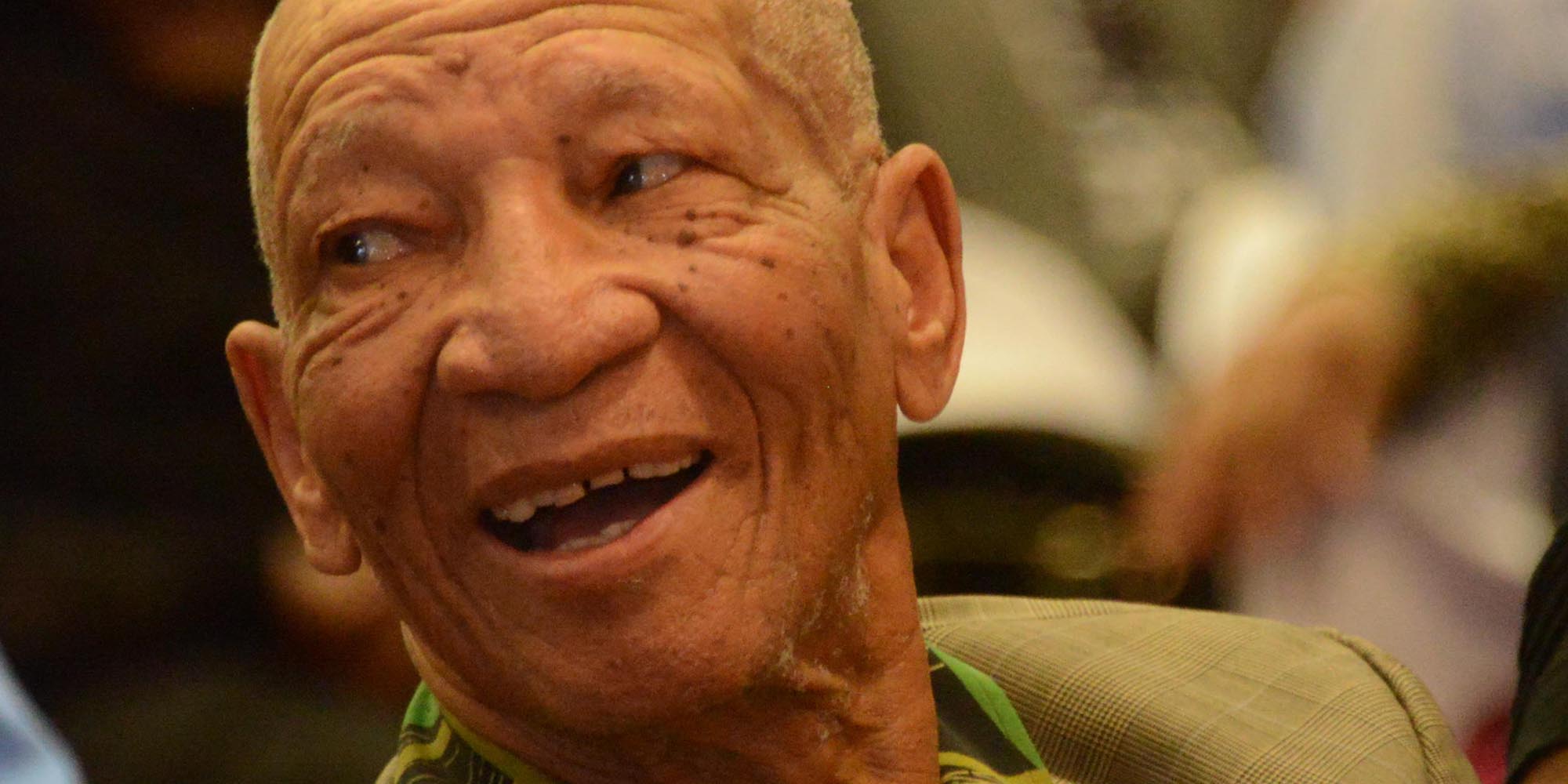
Don Mattera, South African poet and author attends the memorial service of Hugh Masekela at the University of Johannesburg, Soweto Campus, on 28 January 2018. (Photo: Gallo Images / Frennie Shivambu).
There were films about contemporary US dance, theatre and music, and profiles of famous people and their works, such as the Rev Jesse Jackson and his Operation Push. In fact, some films were reserved for a full year’s worth of circulation in advance. In those years, people often rented a projector from one of the city’s ubiquitous film rental outlets and then borrowed our films for their classes, audiences and programmes.
The office’s open access also meant visitors dropped in, often unannounced and without appointments, to speak with us. We actually encouraged this as it meant we would hear firsthand from people about what South African conditions were really like, and so such conversations helped us get a fix on the public temper in the country.
On any given day, an increasingly prominent artist might drop by, carrying a bronze sculpture wrapped in a brown paper bag, asking if we might be interested in purchasing it (as that artist did, and as we did; and the sculpture stands in a prominent place in our house, even now). On another day, the chairman of Johannesburg’s city government’s management committee (the old United Party that was still in control of the city) would visit to discuss the growing pressures he was facing from the National Party’s city council caucus demanding the shuttering of any remaining pockets of city facilities still open to all races.
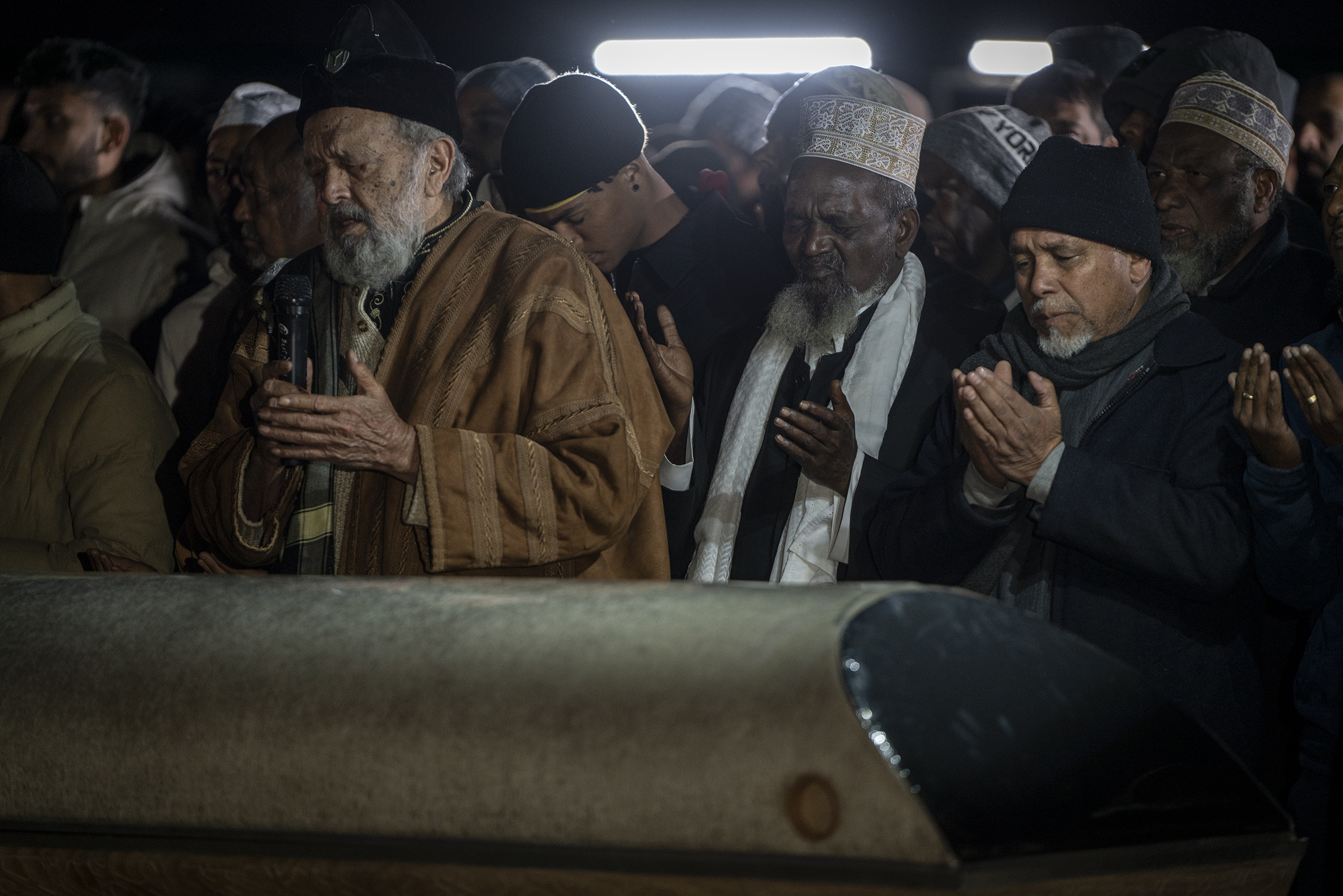
Mourners at the Islamic funeral prayer for Don Mattera at West Park cemetery in Johannesburg, on 18 July 2022. (Photo: Shiraaz Mohamed)
On other days, influential attorneys and advocates might drop in to share tidbits about their current civil rights or human rights cases; social workers would discuss the issues they were wrestling with; and journalists — local and international — might walk in (most of the major newspapers’ offices were near our office) to introduce new colleagues, or to inquire about the US government’s position on some new local atrocity — or just to “skinner” about things, the way journalists often do.
Of course, one of the most important, albeit informal, features of our office routine was the warm welcome given to such visitors. On offer would be coffee or tea, and, especially for black South Africans, unfettered access to our loos. Given that this was an era when finding such a simple civic feature could be nearly impossible for the black majority, our basic staff and library patrons’ restrooms could be a godsend.
‘Bra Zinga’, banned person
In those years, probably the most charismatic individual who came by our office was Don Mattera, or the man known by his street moniker as “Bra Zinga”.
Formerly a highly visible activist, a fiery performance poet, and a rising young journalist; at the time I first met him, Mattera was a sub-editor at The Star newspaper — at their offices just a few blocks from our own space. Mattera had been made a subeditor at The Star rather than a writer because the apartheid government had ruled he was a banned person.
That meant his writings could not be published, he could not speak at any public events, and he was forbidden to be with more than two people at any time, for at least five years. This punishment was designed to silence his increasingly prominent activist’s voice against apartheid’s vision for the country. The Argus Group of newspapers, where he was working, quietly arranged for him to become a subeditor (and had several veteran editors teach him that craft), instead of simply declining to publish his stories, or even firing him as some might have done because he was now effectively unemployable as a working journalist.
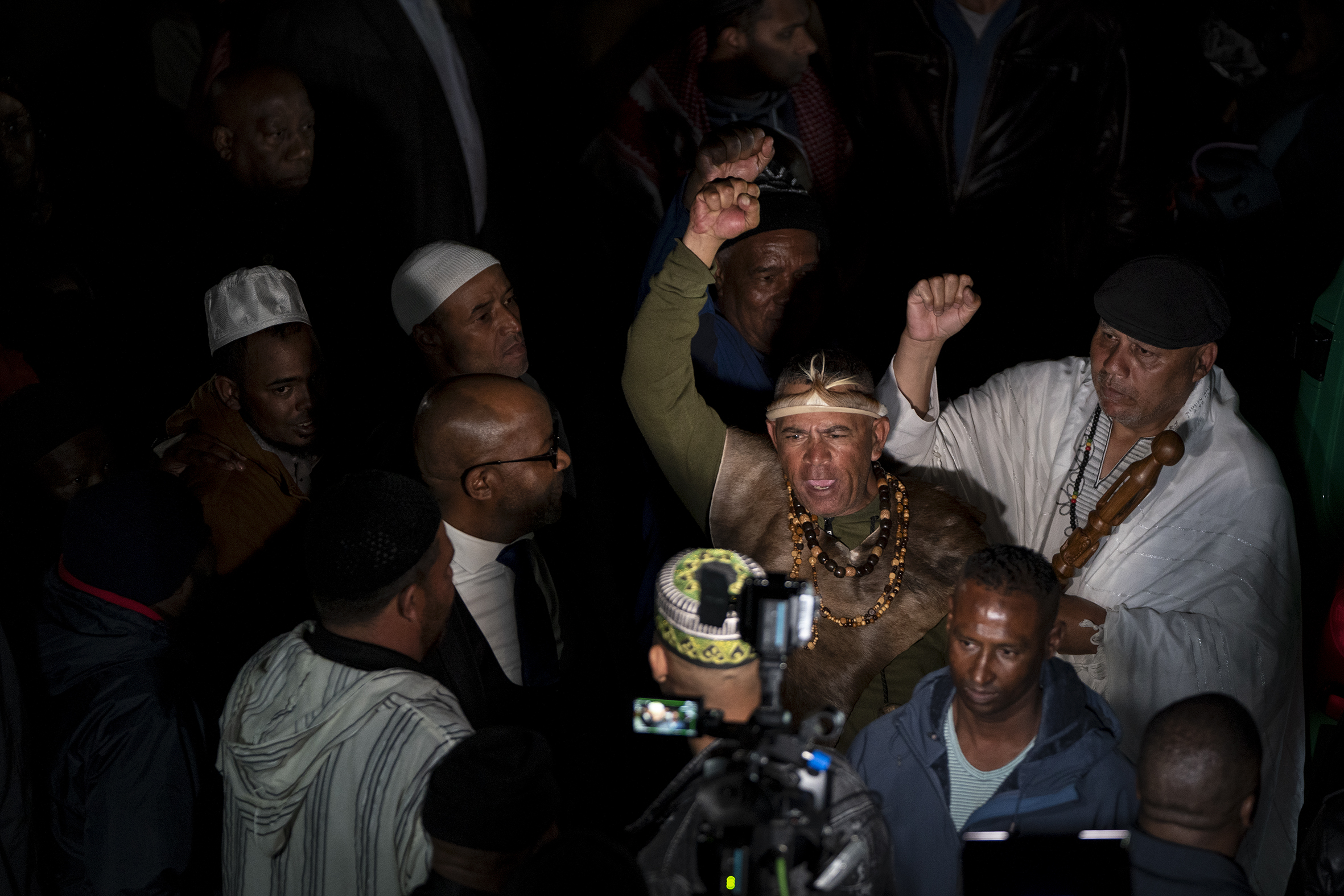
People pay tribute to the late Don Mattera outside his Soweto home on 18 July 2022. (Photo: Shiraaz Mohamed)
When Mattera strode into our facility (yes, he filled up a room as he entered, his boxer’s physique virtually subduing the space around him), one of our South African staffers introduced him to me. In our first meeting, the sheer force of his personality shone beyond whatever personal and professional travails he was facing then. Instead, we spoke about the growing movement of young black South African literary voices as well as US writers, including his own favourites.
‘Memory is the Weapon’
One Friday he stopped in for a chat and some tea, but also to leave what looked like a box of stationery for me to peruse over the weekend. He mentioned he had been working with the novelist Nadine Gordimer in figuring out just how, most effectively, he could tell his life story of growing up in the rough and tumble of Western Native Township and Sophiatown, on the western flank of Johannesburg.
His own lineage — that mix of many of the ethnicities in South Africa, together with a pater familias of a Sicilian grandfather, and then his young adulthood as one of the city’s most fearsome gangsters — was a story he was eager to share with others. In fact, that box contained an early draft of his now-famous memoir, Memory is the Weapon, written on those carbon flimsies on which office workers used to type their second and third copies of correspondence, interleaved with carbon paper sheets.
That weekend, I read it and found the contents engrossing, even if it was still an early, less-than-complete, still episodic narrative.
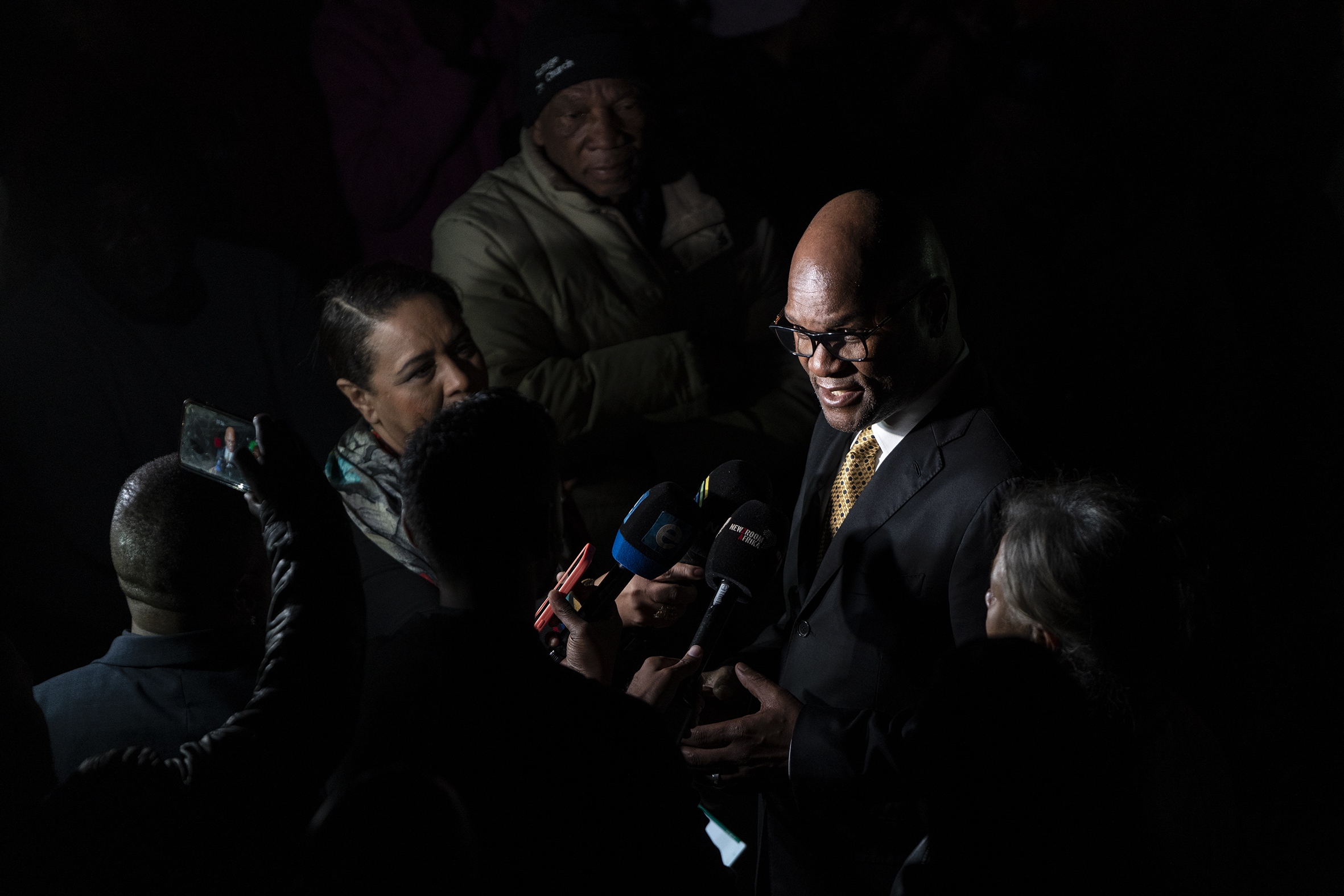
Minister of Arts and Culture, Nathi Mthethwa addresses the media outside Don Mattera’s Soweto home on 18 July 2022. (Photo: Shiraaz Mohamed)
Thinking back, perhaps I was the first person beyond his immediate circle given a chance to see that work while it was still in its early form. When I returned the box to him, I probably did not realise that just by his walking around Johannesburg with that box and sharing it with me, he had violated clauses of his banning order. But it was just as obvious that telling his story was much more important to him than following the diktats of a banning order issued by a repugnant regime.
On another day, he came by for a chat just as I was about to go out on an errand, headed in the direction of The Star offices, to my local bank branch. As we walked together down the street to the paper’s offices, it became clear virtually every black person we encountered — newspaper vendors, messengers, clerks and other office workers, delivery men, beggars, shoeshine men and shadier men with no apparent job, skulking in the alleys between the buildings — every one of them knew Don Mattera. He stopped and acknowledged each of their greetings and it seemed to take us forever to walk those short city blocks to our respective destinations while he was being hailed as a kind of conquering hero.
Arthur Ashe
A few months later, when the African American tennis star Arthur Ashe arrived in Johannesburg for a tennis tournament, Don Mattera contacted me to tell me (not to ask me) to accompany him the next day to the matches. To my surprise, we didn’t have tickets, but we didn’t need them. Don Mattera and Arthur Ashe were already friends from Ashe’s previous visit to South Africa, and that bond was strong enough to get us seated at courtside, waved forward by all the guards and gatekeepers in Ellis Park, without question. Actually, we didn’t have regular seats at all. Instead, we were told to sit on the court itself, right behind the athletes and the coaches’ chairs.
The next day, Ashe went to Mattera’s home for lunch and I tagged along, just to revel in the next chapter of that visit. Once again, that ominous banning order was totally ignored by the dozen or more people gathered around the table for a feast of traditional South African cuisine.
A few months after these events, I was transferred to Washington because of my fiancée’s and my complex arrangements to get married in Swaziland (now Eswatini) so we could avoid the tangle of laws in effect in South Africa since we could not be together in Johannesburg. As a result, we did not see Don for some years, until we returned to South Africa in mid-1989 when I was assigned to the embassy in Pretoria as cultural attaché.
Abdullah Ibrahim
By then, glimmerings of serious change in the South African political climate were about to become visible. The first major political prisoners were released in November 1989 and some longtime exiles — especially cultural figures — were starting to make their way home as well. Among them was the pianist-composer Abdullah Ibrahim, newly back after years of living in the US at the Chelsea Hotel in New York City.
Accordingly, we were starting to set in motion a modest, but increasingly public cultural programme. Thus, in the early months of 1991, we decided to host an evening in the ambassador’s residence with leading South African and US jazz musicians, based on Abdullah Ibrahim’s availability, together with the University of Natal’s Darius Brubeck (the son of Dave Brubeck) and his quartet — comprising Victor Ntoni, Lulu Gontsana, Zim Ngqawana and Michael Rossi. Conveniently, they were en route from Durban with a short stopover in Johannesburg before departing for overseas engagements.
We decided the perfect way to end the evening would be a segment that would unite Mattera reading and Ibrahim improvising on the piano around those spoken words. All the principals concurred with the plan, and so, on the agreed night, the lounge in the ambassador’s residence was filled with more than 100 guests. Brubeck and friends played their set to great applause, and we broke for refreshments. But, when we looked around, there was no Don Mattera.
My colleagues tracked him down by phone at his home in Eldorado Park and they heard the oh-so-familiar lament in South Africa: “No transport”. My imploring response to him on that phone call was, “Don, Don, please, hundreds of people are waiting for you here. Please ask, please beg a neighbour to drive you to us here in Pretoria, but the drive must take less than an hour from your home. We’ll pay any traffic fines you receive! But you must get here.”
Amazingly enough, he did. Perhaps there were no police on duty on the road that night, for there were no roadblocks and no fines. After Ibrahim played his opening solo set, Mattera and Ibrahim engaged in a magical, spontaneous musical-vocal repartee that included some of Mattera’s own poetry and, inevitably, too, recitations of the words of Mattera’s favourite US poet, Emily Dickinson, as well. It was, after all, a US cultural evening. By the time the evening was over, all of us felt we had been transported across a bridge to a much more hopeful place than the angry, strife-ridden South Africa of that time.
Several years later, during our third assignment in South Africa, I joined a dinner to celebrate the successful conclusion of a workshop for Apla (the Azanian People’s Liberation Army, the black consciousness equivalent of MK) veterans shifting from their posture as freedom fighters to an entry into civilian life, a workshop organised by an international NGO. Mattera had been listed as an Apla commander, something I had never known until then, and he had been called in to help encourage their transition to peacetime pursuits through the sheer force of his personality. Similarly, we also saw him at celebratory literary events of the African Writers Association (the black consciousness alternative to the Congress of South African Writers), and even at cultural events in the largely coloured neighbourhood of Eldorado Park.
Still, despite his wide celebrity, the Don Mattera I had known some two decades earlier as a near force of nature was starting to shift to a quieter, more contemplative mode. But he remained the man who loved the near-mystical, enigmatic words of Emily Dickinson, even as his own writing delivered a kind of primal force, an urgency, and a deep intensity. One poem Don Mattera had written in the early 1970s, For a Cent, remains the one I remember most of all from his output.
Each morning
corner of Pritchard and Joubert
and leaning on a greasy crutch near
a pavement dustbin
an old man begs,
not expecting much.
his spectacles are cracked and dirty
he does not see my black hand
drop a cent into his scurvy palm.
but instinctively he mutters:
‘THANK YOU MY BAAS’
Strange
that for a cent
a man can call his brother
‘BAAS’
Farewell, Don. And thank you for the gift of your friendship to me when I first arrived in South Africa. DM


















 Become an Insider
Become an Insider
My first proper job on graduating was to sit next to the towering Don Mattera. He was, besides Barry Ronge, one of the lights in an otherwise grey job of subediting “The Star”. Another was Jon Qwelane, who dibsed for himself the Minister of Revenge portfolio for after the revolution. Don was so quiet and kind, as I recall. PS – show us the bronze!